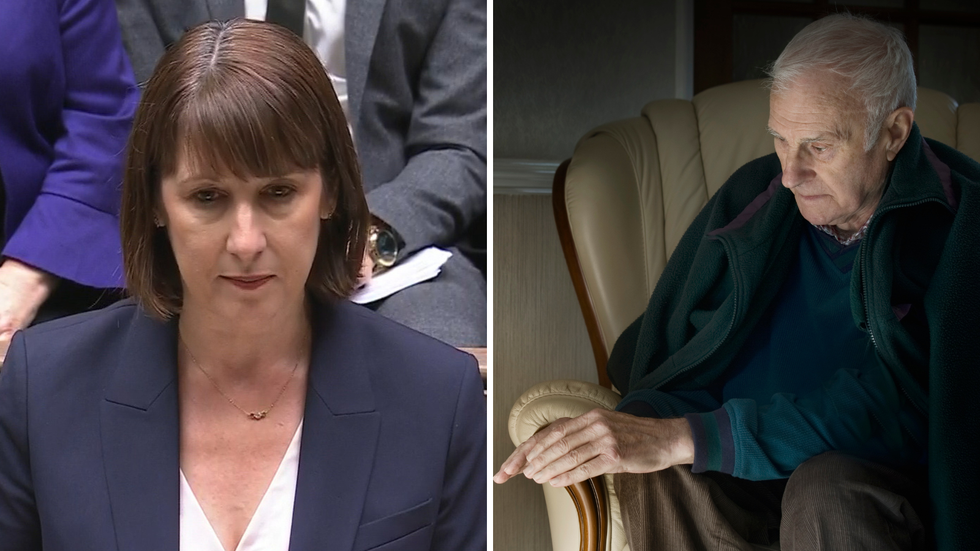Analysis suggests Winter Fuel Payment savings could be much lower than expected: 'More cuts could be required'
Rachel Reeves announced the Winter Fuel Payment would become means-tested later this year in the House of Commons yesterday
Don't Miss
Most Read
Trending on GB News
The savings set to be made by means-testing Winter Fuel Payments could be dramatically curtailed if hundreds of thousands of pensioners claim the support they’re entitled to. It's sparked fears the Government could make further cuts to plug the spending gap.
A surge in Pension Credit take-up – a means-tested benefit for low income people who have reached state pension age - could reduce savings by nearly half a billion pounds, according to analysis by Steve Webb, partner at pension consultants LCP.
The modelling suggests that if one in four of those currently entitled to Pension Credit but not claiming it were to put in a claim, around a third could be wiped off the Chancellor’s assumed savings from the Winter Fuel Payment cut.
Between 720,000 and 880,000 people are estimated to miss out on Pension Credit, according to the latest figures, published in January 2024 and covering the financial year ending March 2022.
The data indicates the average (mean) amount of unclaimed Pension Credit at the time was £2,200 per year.
Means-testing the Winter Fuel Payment aims to save £1.4billion in 2024/25, however, if the decision prompted just one in four people missing out on Pension Credit to claim their entitlement, it would cost the Government £490million.
Have you got a money story you'd like to share? Get in touch by emailing money@gbnews.uk.

Rachel Reeves has announced the Winter Fuel Payment will become means-tested later this year
PA | GETTY
Steve Webb, partner at LCP said it was “highly likely” that the announcement would lead to a “flurry” of new claims for Pension Credit.
“This is exactly what happened when entitlement to a free TV licence for the over 75s was restricted to those on benefit,” he said.
“But a big surge in take-up could slash the savings from this measure.
“If just one in four of those currently missing out on their entitlement to Pension Credit now makes a claim this could cut the Chancellor’s savings by around one third.
“One consequence of this is that additional cuts might be required to make up for the shortfall.”
Pension Credit claims surged in 2019, after it was announced that the free TV licence for over 75s would be restricted to those on Pension Credit.
Pension Credit claims rose from 7,600 in the four weeks to June 7 to 9,300 in the four weeks to July 4.
The Office for Budget Responsibility (OBR) said at the time: “The BBC’s announcement appears already to have had an effect.”
According to Sir Steve, there are several reasons why there could be a greater effect on Pension Credit claims from this week’s announcement.
The decision affects all pensioners, rather than just those aged 75+, meaning it applies to a much larger group.
Pensioners under 75 are more likely to be digitally aware, so could be more willing to claim Pension Credit online, Sir Steve suggested.
Thirdly, the amount lost – typically between £200 and £300 is greater than the cost of a TV licence in 2019, which was £154.50.
However, there’s no guarantee the hundreds of thousands of low income pensioners who are missing out on Pension Credit will claim their entitlement, sparking concern that the poorest pensioners will miss out on even more support.
Caroline Abrahams CBE, Charity Director at Age UK said the charity “strongly opposes” the decision.
She said: “More than 800,000 older people living on very low incomes – under £218.25 a week for single pensioners and under £332.95 for couples – who are already missing out of the Pension Credit they are entitled to get to boost their incomes, will now lose the WFP that helps them to pay their fuel bills.”
Age UK said their initial estimate is that as many as two million pensioners who badly need the money to stay warm this winter will not get it and will be in trouble as a result.
“Yet at the other end of the spectrum well-off older people will scarcely notice the difference – a social injustice,” Abrahams said.
MORE FROM GBN MEMBERSHIP:
Abrahams urged the Government to halt the proposed change, adding: “Means-testing WFP this winter, with virtually no notice and no compensatory measures to protect poor and vulnerable pensioners, is the wrong policy decision, and one that will potentially jeopardise their health as well as their finances – the last thing they or the NHS needs.”
What is the Winter Fuel Payment?
The Winter Fuel Payment was introduced in 1997 by Labour's Gordon Brown to help older people meet the costs of heating their homes in the winter.
It is worth between £100 and £350 for pensioners, although from this autumn, those not on Pension Credit or other means-tested benefits will no longer receive the payment.
The amounts paid in recent years have been higher than usual, as they included a "Pensioner Cost of Living Payment", worth between £150 and £300.









